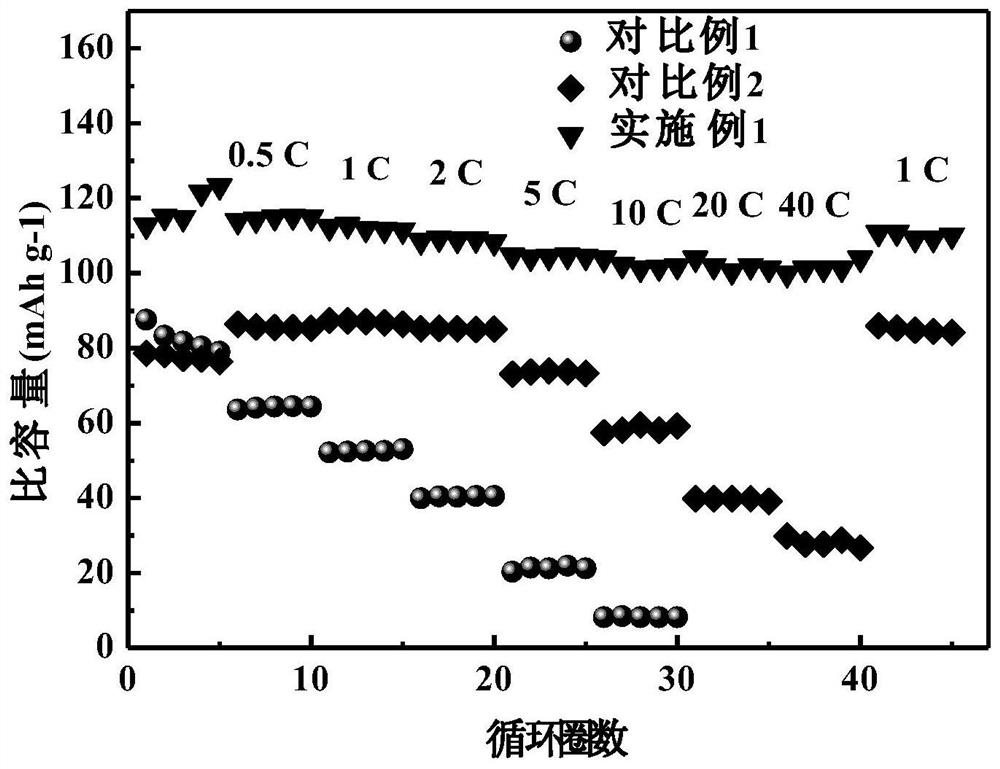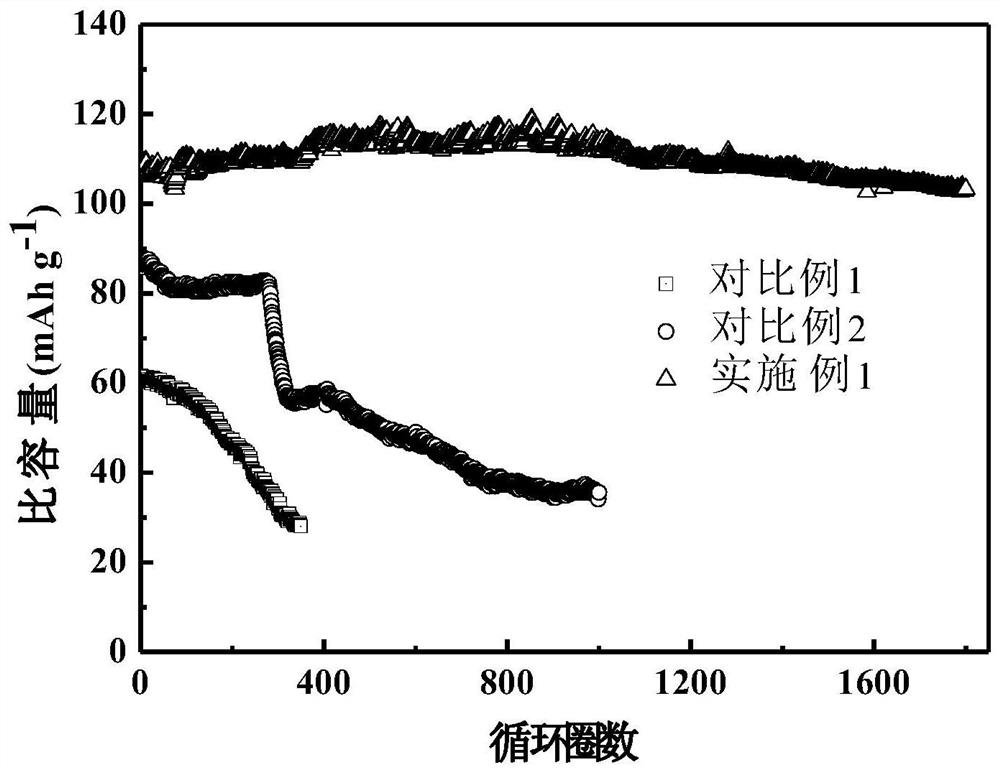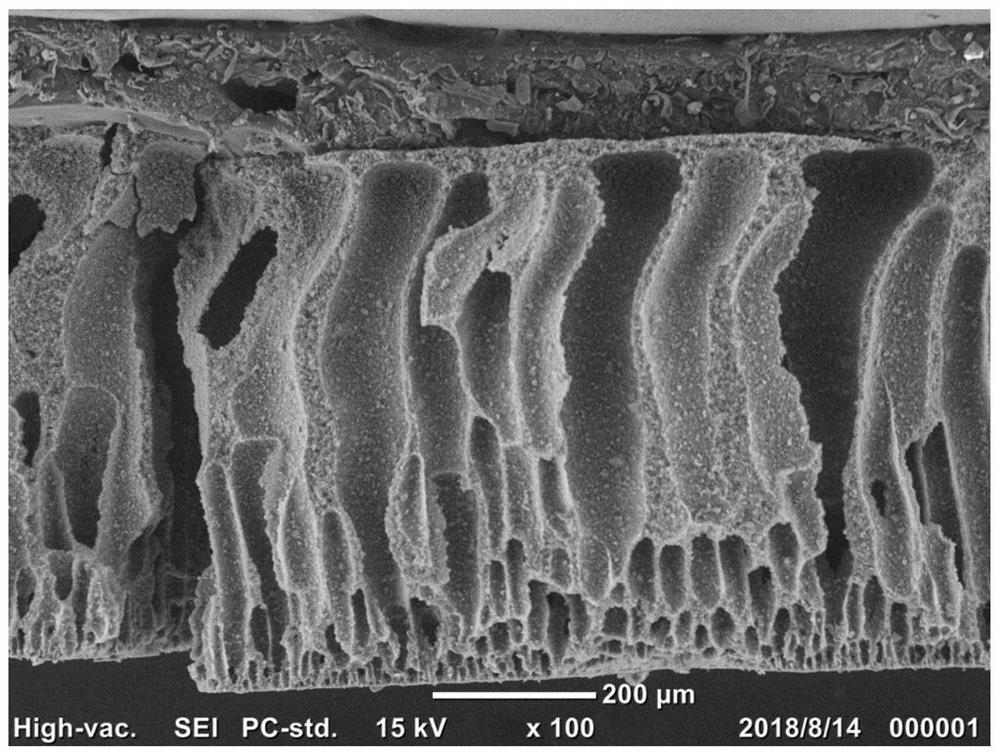Preparation of a high-load self-supporting thick electrode and its application in sodium-ion batteries
A sodium ion battery, self-supporting technology, applied in the direction of battery electrodes, secondary batteries, non-aqueous electrolyte battery electrodes, etc., can solve the problems of long sodium ion diffusion path, poor rate performance, slow diffusion, etc., and achieve excellent cycle performance , increase energy density, improve the effect of binding force
- Summary
- Abstract
- Description
- Claims
- Application Information
AI Technical Summary
Problems solved by technology
Method used
Image
Examples
Embodiment 1
[0036] Embodiment 1: (preparation Na 3 V 2 (PO 4 ) 3 @3DFLC-1 self-supporting electrode)
[0037] Weigh 5 g of polyacrylonitrile (organic polymer resin) and add it into 45 g of DMF, and stir for 5 hours until completely dissolved to form a 10% resin solution. Add 10 g of Na to the resin solution 3 V 2 (PO 4 ) 3 (electrode material), stirred for 12 hours, then ultrasonicated for 3 hours, and then stirred for 24 hours to obtain a uniformly dispersed mixed solution. Spread the mixed solution on a glass plate, volatilize for 1mins, set the thickness of the film to 1000μm, and then immerse it in a mixed solution of water and ethanol (1:1 in mass ratio) for 180 minutes, and solidify to form a porous composite membrane. The composite film was pre-calcined at 300 °C for 3 h in an air atmosphere, and then calcined at 800 °C for 4 h in an argon atmosphere to obtain 12 mg cm -2 , 600 μm thick Na 3 V 2 (PO 4 ) 3 @3DFLC-1 self-supporting electrode. The prepared Na 3 V 2 (PO...
Embodiment 2
[0038] Embodiment 2: (preparation Na 3 V 2 (PO 4 ) 3 @3DFLC-2 self-supporting electrode)
[0039] Weigh 5 g of polyacrylonitrile (organic polymer resin) and add it into 45 g of DMF, stir for 6 hours until completely dissolved, and form a 10% resin solution. Add 40 g of Na to the resin solution 3 V 2 (PO 4 ) 3 (electrode material), stirred for 12 hours, then ultrasonicated for 3 hours, and then stirred for 24 hours to obtain a uniformly dispersed mixed solution. Spread the mixed solution on a glass plate, volatilize for 1mins, set the thickness of the film to 1000μm, and then immerse it in a mixed solution of water and ethanol (1:1 in mass ratio) for 180 minutes, and solidify to form a porous composite membrane. The composite film was pre-calcined at 300 °C for 3 h in an air atmosphere, and then calcined at 800 °C for 4 h in an argon atmosphere to obtain 45 mg cm -2 , 600 μm thick Na 3 V 2 (PO 4 ) 3 @3DFLC-2 self-supporting electrode. The battery assembly is the s...
Embodiment 3
[0040] Embodiment 3: (preparation Na 3 V 2 (PO 4 ) 3 @3DFLC-3 self-supporting electrode)
[0041] Weigh 5 g of polyacrylonitrile (organic polymer resin) and add it into 45 g of DMF, stir for 4 hours until completely dissolved, and form a 10% resin solution. Add 10 g of Na to the resin solution 3 V 2 (PO 4 ) 3 (electrode material), stirred for 12 hours, then ultrasonicated for 3 hours, and then stirred for 24 hours to obtain a uniformly dispersed mixed solution. Spread the mixed solution on a glass plate, volatilize for 1mins, set the thickness of the film to 1000μm, and then immerse in the mixed solution of water and ethanol (1:15 in mass ratio) for 180 minutes, and solidify to form a porous composite membrane. The composite film was pre-calcined at 300 °C for 3 h in an air atmosphere, and then calcined at 800 °C for 4 h in an argon atmosphere to obtain 12 mg cm -2 , 600 μm thick Na 3 V 2 (PO 4 ) 3 @3DFLC-3 self-supporting electrodes. The battery assembly is the ...
PUM
| Property | Measurement | Unit |
|---|---|---|
| thickness | aaaaa | aaaaa |
| thickness | aaaaa | aaaaa |
Abstract
Description
Claims
Application Information
 Login to View More
Login to View More - R&D
- Intellectual Property
- Life Sciences
- Materials
- Tech Scout
- Unparalleled Data Quality
- Higher Quality Content
- 60% Fewer Hallucinations
Browse by: Latest US Patents, China's latest patents, Technical Efficacy Thesaurus, Application Domain, Technology Topic, Popular Technical Reports.
© 2025 PatSnap. All rights reserved.Legal|Privacy policy|Modern Slavery Act Transparency Statement|Sitemap|About US| Contact US: help@patsnap.com



